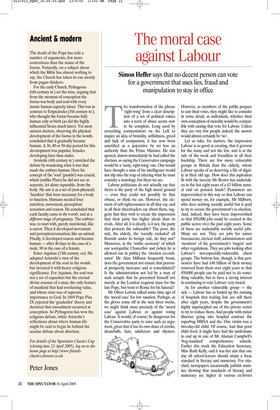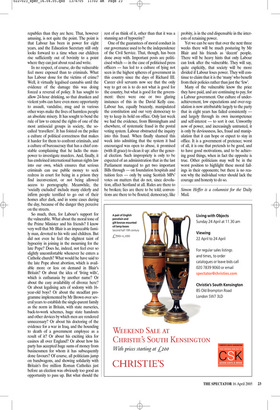The moral case against Labour
Simon Heffer says that no decent person can vote for a government that uses lies, fraud and manipulation to stay in office The transformation of the phrase ‘right-wing’ from a clear description of a set of political values into a term of abuse seems now to be complete. Long used by screeching commentators on the Left to inspire an idea of brutality, selfishness, greed and lack of compassion, it has now been sanctified as a pejorative by no less an authority than the Prime Minister. He was quoted, almost immediately he had called the election, as saying the Conservative campaign would be a ‘nasty, right-wing’ one. One would have thought a man of his intelligence would not slip into the trap of uttering what he must consider a tautology, but there we are.
Labour politicians do not actually say that theirs is the party of the high moral ground — even they could not possibly be that obtuse, or think we are. However, the element of self-righteousness in all they say, and in all their cheerleaders say about them, suggests that they wish to create the impression that their party has higher ideals than its rivals. After all, it is clearly, is it not, the party that protects the vulnerable? The poor, the sick, the elderly, the ‘socially excluded’ all flourish under its benign rule, do they not? Moreover, in the ‘stable economy’ of which our sociopathic Chancellor and (when he is allowed out in public) the ‘election co-ordinator’ Mr Alan Milburn frequently boast, does the government not ensure that personal prosperity increases and is consolidated? Is the administration not led by a man of such scruple that he presented himself not merely at the London requiem mass for the late Pope, but went to Rome for his funeral?
Mr Oliver Letwin talked some time ago of the ‘moral case’ for low taxation. Perhaps, as the gloves come off in the next three weeks, we might think more precisely of the ‘moral case’ against Labour, or against voting Labour. It would, of course, be dangerous for the Conservative party to raise such an argument, given that it has its own share of crooks, sleazeballs, liars, adulterers and shysters. However, as members of the public prepare to cast their votes, they might like to consider in some detail, as individuals, whether their own conception of morality would be compatible with casting that vote for Labour. Unless they are very low people indeed, the answer would almost certainly be ‘no’.
Let us take, for starters, the impression Labour is so good at creating, that it governs for the many and not the few, and is at the side of the weak and friendless in all their hardship. There are few more vulnerable groups in Britain than the elderly, whom Labour speaks of as deserving a life of dignity in their old age. How does this aspiration fit with the larceny Mr Brown has undertaken in the last eight years of a £5 billion annual raid on pension funds? Pensioners are impoverished in this way so that Labour can spend money on, for example, Mr Milburn, who does nothing socially useful but is paid to try to secure the government’s re-election. And, indeed, they have been impoverished so that 850,000 jobs could be created in the public sector over the past eight years. Some of these are undeniably socially useful jobs. Many are not. They are jobs for minor bureaucrats, clerical staff, administrators and ‘monitors’ of the government’s ‘targets’ and other regulations. They are jobs looking after Labour’s not-especially-vulnerable client groups. The bottom line, though, is that pensioners have had £40 billion of their money removed from them over eight years so that 850,000 people can be paid not to do something valuable, but to have a strong interest in continuing to vote Labour: very moral.
As for another vulnerable group — the sick — Labour has so fouled up the running of hospitals that waiting lists are still there after eight years, despite the government’s highly unprincipled use of the private sector to try to reduce them. And people with minor illnesses going into hospital contract the superbug MRSA and die. One victim was a two-day-old child. Of course, had that poor child lived, it might have had the misfortune to end up in one of Mr Alastair Campbell’s ‘bog-standard’ comprehensive schools. Earlier this week the Education Secretary, Miss Ruth Kelly, said it was her aim that one day all school-leavers should attain a basic standard in literacy and numeracy. For mischief, newspapers occasionally publish statistics showing that standards of literacy and numeracy are higher in various ex-Soviet republics than they are here. That, however amusing, is not quite the point. The point is that Labour has been in power for eight years, and the Education Secretary still only looks forward to a time when our children rise sufficiently out of bovinity to a point where they can just about read and write.
In no respect, of course, do the vulnerable feel more exposed than to criminals. What has Labour done for the victims of crime? Well, it virtually legalised cannabis until the evidence of the damage this was doing forced a reversal of policy. It has sought to allow 24-hour drinking, so that drunken and violent yobs can have even more opportunity to assault, vandalise, mug and in various other ways make the lives of harmless people an absolute misery. It has sought to bend the rule of law to extend the rights of one of the most antisocial groups in society, the socalled ‘travellers’. It has foisted on the police a culture of political correctness that makes it harder for them to confront criminals, and a culture of bureaucracy that has a chief constable complaining that he lacks the manpower to investigate murders. And, finally, it has enshrined international human rights law into our own, which ensures that serious criminals can use public money to seek redress in court for being in a prison they find inconvenient, or not being allowed access to pornography. Meanwhile, the ‘socially excluded’ include many elderly and infirm people terrified to go out of their homes after dark, and in some cases during the day, because of the danger they perceive on the streets.
So much, then, for Labour’s support for the vulnerable. What about the moral tone of the Prime Minister and his friends? I know very well that Mr Blair is an impeccable family man, devoted to his wife and children. But did not even he feel the slightest taint of hypocrisy in joining in the mourning for the late Pope? Does he, indeed, not feel ever so slightly uncomfortable whenever he enters a Catholic church? What would he have said to the late Pope about abortion, which is available more or less on demand in Blair’s Britain? Or about the idea of ‘living wills’, which is euthanasia by another name? Or about the easy availability of divorce here? Or about legalising acts of sodomy with 16year-old boys? Or about the steadfast programme implemented by Mr Brown over several years to establish the single-parent family as the norm in Britain, with state nurseries, back-to-work schemes, huge state handouts and other devices by which men are rendered unnecessary? Or about his doctoring of the evidence for a war in Iraq, and the hounding to death of a government employee as a result of it? Or about his exciting idea for casinos all over England? Or about how his party has accepted huge sums of money from businessmen for whom it has subsequently done favours? Of course, all politicians jump on bandwagons, and showing solidarity with Britain’s five million Roman Catholics just before an election was obviously too good an opportunity to pass up. But what should the rest of us think of it, other than that it was a stunning act of hypocrisy?
One of the guarantees of moral conduct in our governance used to be the independence of the Civil Service. That, though, has been done away with. Important posts are politicised which — in the case of politicised press officers — has led to a culture of lying not seen in the highest spheres of government in this country since the days of Richard III. Career civil servants now see that the only way to get on is to do not what is good for the country, but what is good for the government: there were one or two glaring instances of this in the David Kelly case. Labour has, equally brazenly, manipulated the constitution and our very democracy to try to keep its hold on office. Only last week we had the evidence, from Birmingham and elsewhere, of systematic fraud in the postal voting system. Labour obstructed the inquiry into this fraud. When finally shamed this week into admitting that the system it had encouraged was open to abuse, it promised (with ill grace) to clean it up: after the general election. Such impropriety is only to be expected of an administration that in the last Parliament managed to get two important Bills through — on foundation hospitals and tuition fees — only by using Scottish MPs’ votes on matters that do not, since devolution, affect Scotland at all. Rules are there to be broken; lies are there to be told; conventions are there to be flouted; democracy, like probity, is in the end dispensable in the interests of retaining power.
Yet we can be sure that over the next three weeks there will be much posturing by Mr Blair and his friends as ‘decent’ people. There will be heavy hints that only Labour can look after the vulnerable. They will say, quite explicitly, that society will be more divided if Labour loses power. They will continue to claim that it is the ‘many’ who benefit from their policies rather than just the ‘few’.
Many of the vulnerable know the price they have paid, and are continuing to pay, for a Labour government. Our culture of underachievement, low expectations and over-regulation is now attributable largely to the party that in eight years has failed consistently and largely through its own incompetence and self-interest — to sort it out. Unworthy now of power, and increasingly untrusted, it is only by deviousness, lies, fraud and manipulation that it can hope or expect to stay in office. It is a government of pretence; worst of all, it is one that pretends to be good, and to have good motivations, and to be achieving good things, when in fact the opposite is true. Other politicians may well be in the worst position to highlight these moral failings in their opponents; but there is no reason why the individual voter should lack the courage and honesty to do so.

























































 Previous page
Previous page